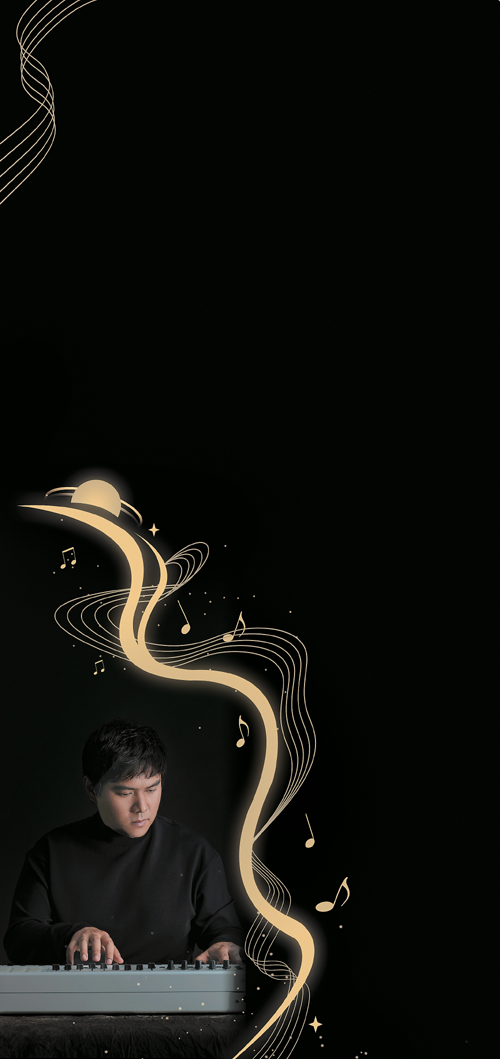The ever-evolving composer

Renowned Chinese composer Chen Kun explores new musical vistas by blending traditional music with cutting-edge technology.
Red Sorghum (1988), A Bite of China (2012), The Wandering Earth (2019) — these films and television works owe much of their sensational success to their brilliant soundtracks.
Behind these iconic scores stands a single name: Chen Kun, also known by his stage name Roc Chen.
As a renowned Chinese composer and music producer, Chen has contributed to over 150 projects, with the films he has worked on collectively earning more than 20 billion yuan at the box office.
Now, Chen has curated his classic film and television scores for a live concert titled Roc Chen's Universe.
Performed by an electronic band together with orchestral musicians, this auditory feast premiered in his hometown of Chengdu, Sichuan province, on Oct 7 and will hit Shanghai on Dec 31, New Year's Eve. Chen regards this concert as the "culmination and selection" of his career in film scoring.
In addition to familiar classics, he also introduced Space Station Falling from The Wandering Earth — a track that has never been released on music platforms. To the audience's surprise, the piece was performed by an AI-generated digital singer named Leah.
"This piece is about the collapse of human hope — an apocalyptic feeling, conveyed through a female voice," Chen explained. "I initially considered inviting a female singer, but as a film composer with a technological edge, I wanted to offer the audience something truly fresh."
Chen places great emphasis on integrating technology into music, describing his approach as "playing the piano keyboard with one hand and pressing the computer keyboard with the other".
During his middle school years, he won top awards in municipal programming competitions. He later pursued a degree in communication engineering at the University of Electronic Science and Technology of China, where he was exposed to both electronic science and symphony orchestras. His journey into music composition began when he enrolled at the Sichuan Conservatory of Music for graduate studies.
"You can compose music using numbers, formulas, or by applying digital processing methods to music creation," Chen explained.
On a TV reality show, he composed a melody based on the birthdate of Chinese actor Wang Yibo, which received widespread acclaim.
He also frequently uses computers to process the timbre of musical instruments in innovative ways.
"We can use scientific methods to achieve harmony in music, such as controlling chords, rhythms, and synthesizing sounds," Chen said. But that's just the rational part of music. "The interpretation by singers completes the emotional expression," he said.
"Both rationality and emotion are crucial aspects of our humanity. Music is a perfect blend of both," he added.
Chen deeply admires the French composer Claude Debussy for his ability to evoke both Western and Eastern musical sensibilities. He aspires to become a "tech-savvy Debussy", aiming to create a fusion of music that bridges Eastern and Western cultures, as well as traditional and modern technologies.
"Music serves as an international language, allowing us to tap into shared human emotions — sorrow, happiness, or a sense of achievement — regardless of our backgrounds," he said.
Chen's musical score for the Chinese historical fantasy television series, Love Between Fairy and Devil, has garnered significant praise from international viewers on Netflix.
"Even when composing for Chinese period dramas, I take a 'borderless' approach, which has undeniably resonated with audiences globally. I find this particularly intriguing," Chen said.
He believes that what is national can also be global and that music with Chinese characteristics does not necessarily have to rely heavily on traditional Chinese instruments.
For example, The Wandering Earth franchise features extensive use of Western symphonic music, but the themes of family and country it conveys are distinctly Chinese.
The music for the first installment was recorded with musicians from Sydney, Australia, while the sequel's score was performed by an orchestra from Vienna, Austria.
According to Chen, foreign musicians found this type of Chinese music both novel and relatable.
Making the film's original soundtrack more youthful is also important to Chen. He mentioned that for the ending credits of The Wandering Earth, he composed a piece called New Journey, which incorporates a lot of electronic music.
"Many viewers said they were glued to their seats in the cinema, unwilling to leave because they were captivated by this piece," he said.
Chen has observed that the new generation of young listeners is highly interactive and creative. "When they listen to music, it's as if they are searching for hidden codes," he said.
For instance, 550W/Moss, one of his compositions for The Wandering Earth, features a little girl singing in a pattern of long and short notes, giving Moss — the intelligent quantum computer in the film — a sense of heartbeat and breath. Some young listeners translated these sounds into Morse code and deciphered their meanings, adding to the film's sci-fi flavor.
Chen said he did not anticipate this while composing but was pleasantly surprised by the audience's interpretations.
As more Chinese films gain international audiences, a new generation of young musical talents is thriving. Chen welcomes this trend but cautions young musicians to focus on mastering the fundamentals of music.
"With the help of AI, the threshold for making music nowadays has been lowered. But to go far, you still need to build a solid foundation and deeply study and understand those, perhaps ancient and boring, theoretical aspects," he said.
guiqian@i21st.cn























